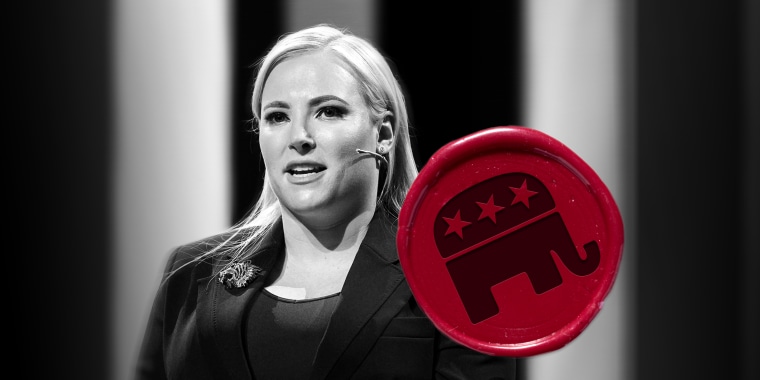In her new audio memoir “Bad Republican,” out Thursday, Meghan McCain describes what she calls the “toxic” environment on the set of ABC’s “The View” and appears to include in that toxicity co-host Joy Behar questioning McCain’s stubborn allegiance to the GOP.
Why so many Americans are stubbornly sticking to the Republican Party is something everybody who isn’t a Republican has come to worry about.
In a written excerpt of her memoir published in Variety, the former resident Republican on the talk show said it got back to her that Behar didn’t understand her willingness to continue defending the party that had picked Donald Trump over Meghan McCain’s father, Vietnam War P.O.W. Sen. John McCain.
Who can understand it?
Trump defiled everything Republicans had professed to hold sacred when he mocked McCain’s prisoner-of-war experience. "He's not a war hero,” Trump said. “He's a war hero because he was captured. I like people that weren't captured."
In 2018, before Washington gathered to mourn the senator’s death from brain cancer, the American Legion had to beg Trump to lower the flag at the White House to half staff. By continuing to give Trump its support, the Republican Party endorsed the disparagement of Sen. McCain, prisoners of war and veterans generally.
Yet on “The View,” Meghan McCain defended that party daily. In Variety’s excerpt, in response to Behar’s apparent befuddlement, she says, “Why was that something she had to worry about?”
Why so many Americans are stubbornly sticking to the Republican Party is something pretty much everybody who isn’t a Republican has come to worry about. Why did so many millions who watched the party forsake them not bid it goodbye but desperately chase it down and grab on for dear life?
So, yes, we need help understanding why McCain defended the Republican Party till the end, an answer other than the less than satisfactory response that “that was my job on the show.” Was it all about money for McCain? Was she just a richer “Diamond and Silk?”
The most obvious answer is that McCain, like most Americans, sees her political affiliation not as a choice but as an identity; that is, something not subject to change with time — or even heresies.
There’s a growing body of work among political scientists studying polarization claiming that nothing is as rigid as our political affiliations and that animus for those of the other party is higher and scarier than it’s ever been.
We pick our neighborhoods based on our political affiliation; we weed out potential partners who don’t share our politics. And as New York University political scientist Patrick Egan wrote in 2019, “small but significant shares of Americans” who sense that their identities regarding religion, ethnicity, sexual orientation and class conflict somehow with their political affiliations “bring their identities into alignment with their politics.”
Was it all about money for McCain? Was she just a richer “Diamond and Silk?”
But we knew that, right? Especially after white evangelicals who excoriated President Bill Clinton for sexual immorality and later declared the more egregiously licentious Trump “God’s anointed.”
McCain’s got to know — as so many others must know — that the Republican Party can’t be politically coherent, morally decent or even factually honest with Trump as its leader. But to walk away from one’s political party in today’s America means disrupting, and potentially destroying, every other aspect of one’s life. Few are willing to do that.
McCain’s memoir was released the same week that Gen. Colin Powell died at 84. Many stories on the former secretary of state and chairman of the Joint Chiefs of Staff mention his departure from the Republican Party, but even he waited until after spineless Republicans shrugged at the sacking of the U.S. Capitol to announce unambiguously he was gone.
“I can no longer call myself a Republican… Right now I’m just watching my country and not concerned with the parties,” he told CNN’s Fareed Zakaria after that attack. Referring to Republicans who yielded to Trump, Powell said, “They should have known better.”
Maybe he should have known better, too, if not about Trump, then about the party. A Black, first-generation American, Powell spent decades decrying the racism and xenophobia Republican candidates used to whip up their base. In a 2015 speech, he joked, “I want to continue to be a Republican because it annoys them.” But however annoying he believed his presence to be, it didn’t stop the party from nominating Trump.
McCain seems eager to point out that she’s not in lockstep with the party. The new mother considers it “a problem” that “not all conservatives believe in paid family leave” despite their “pro-family” rhetoric. Also, McCain’s disappointment that the set of “The View” wasn’t a warm and welcoming space for her sounds like the kind of lament conservatives typically mock.
But as Powell’s experience demonstrated, being a “Bad Republican” isn’t enough. The party has elevated and continues to elevate politicians promoting hatred, mendacity and violence. There are no modifiers — not “bad,” not “moderate,” not “establishment” — that create sufficient distance from the menace the party has become.
McCain says she’s a “bad Republican.” She should get back to us when she’s an ex-Republican. Maybe then we’ll care enough to listen.

